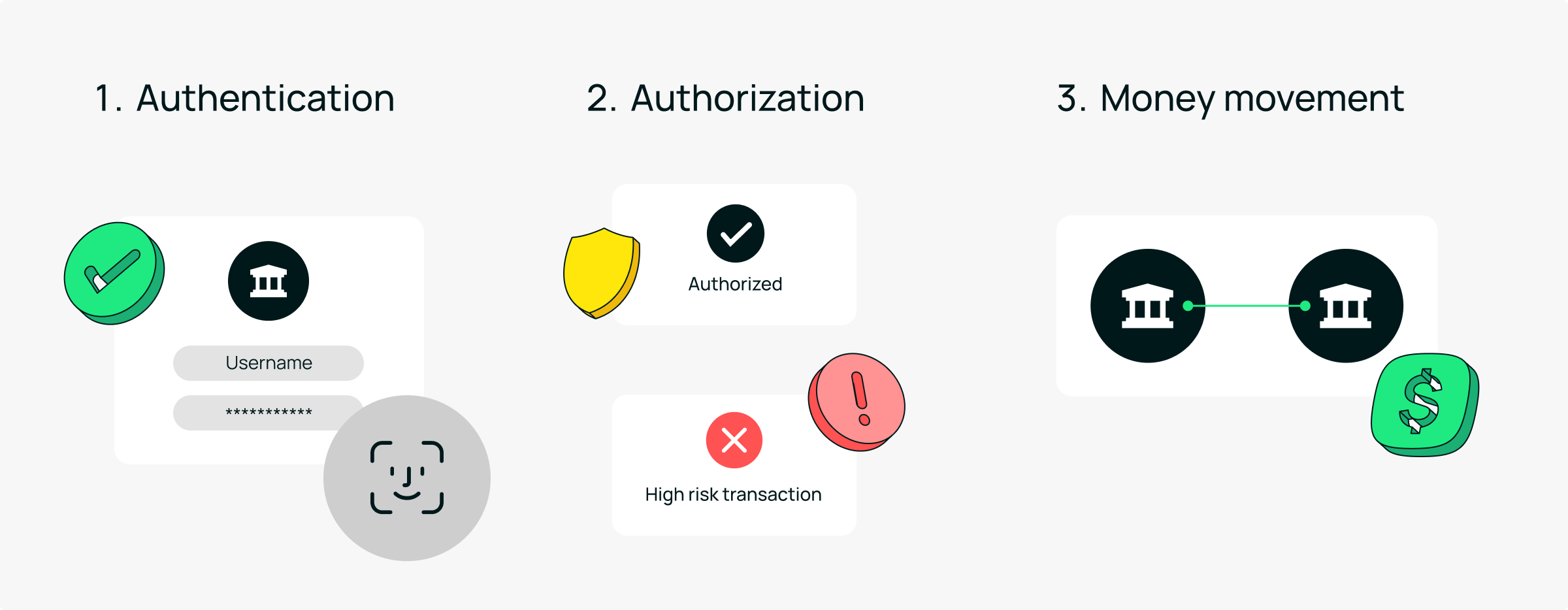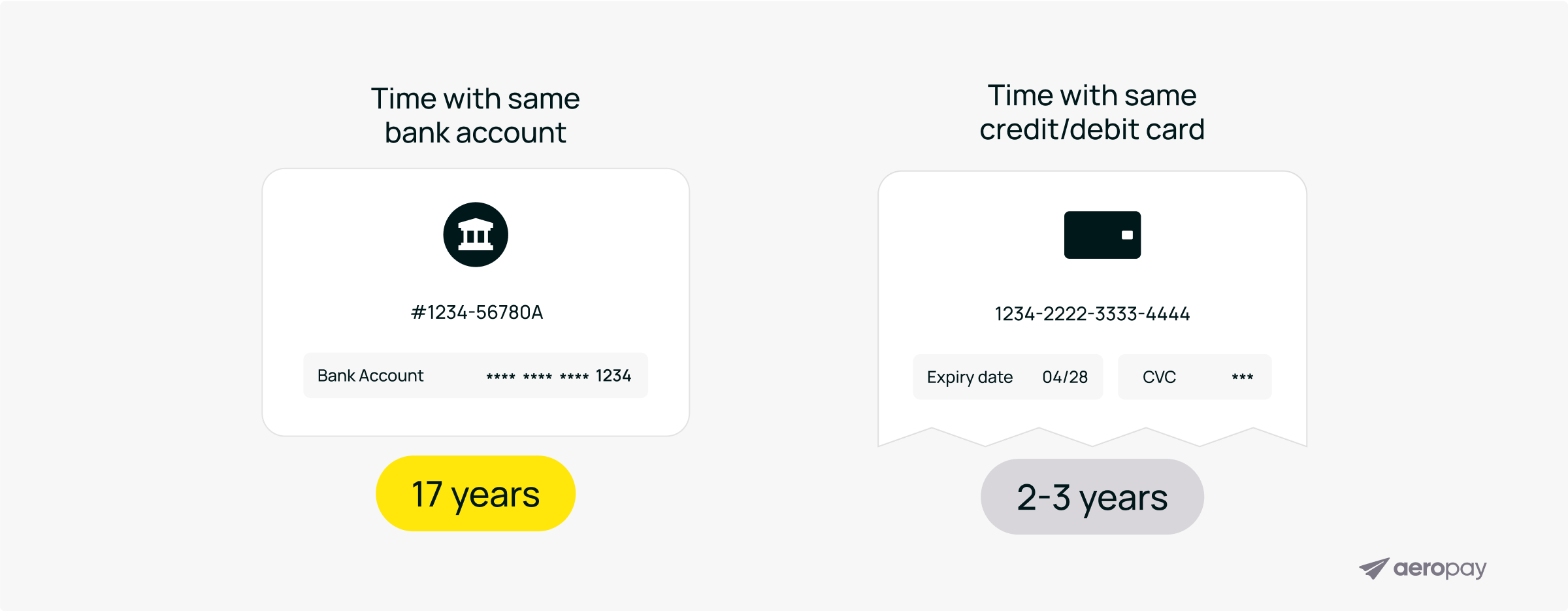Find out how much payments are costing your business. And how much you could be saving with pay-by-bank.
________________
Pay-by-bank (also called A2A)is a direct form of payment that enables an electronic transfer of funds between two bank accounts. This can be from person to person, person to business, or any other flow of money.
Two accounts are typically linked by a bank aggregator, which acts as an intermediary between the parties. This secure connection enables real-time fraud detection and prevention. It also avoids expensive card network rails.

Pay-by-bank adoption is accelerating as more merchants and consumers realize its value.
Certain use cases are catching on faster than others, like:
Higher conversion and approval rates
Pay-by-bank allows first-time consumers to log in to their bank account to pay. For future transactions, payment can be completed in a single click—removing friction at checkout.
Merchants can also access real-time data directly from consumers’ banks, which enhances the authentication process and reduces the risk of fraud.

Durable payment information
On average, Americans have the same bank account for 17 years, compared to only 2-3 years for cards. Allowing customers to link their bank account for payment maintains accurate payment details for much longer.
Lower cost
Pay-by-bank is one of the most affordable payment methods for merchants. Most payment-related costs are interchange fees, which pay-by-bank completely eliminates by allowing you to accept ACH payments.
Because of bank-level security protocols, real-time authentication, and other fraud reduction measures, pay-by-bank greatly reduces chargebacks and disputes.
Let’s look at some of the most widely accepted payment methods in the United States and add up the true cost for merchants.
Note: The associated costs provided are averages based on industry, volume, and a number of other factors. Payment processing costs vary depending on each merchant’s individual circumstances.
.png)
Credit cards are very common and popular with consumers, but they’re expensive for merchants.
The fee structure associated with credit card processing depends on factors like;
Common costs associated with credit cards include:
1. Interchange fees. Charged by card-issuing banks, interchange fees range from 1.5% to 3% of a transaction amount.
This fee varies based on the card type (e.g., rewards cards have higher fees) and transaction type (e.g., in-person vs. online).
→ Example: Visa interchange fees range from 1.15% + $0.05 for debit cards to 2.95% + $0.10 for rewards credit cards.
2. Assessment fees. Charged by card networks (Visa, Mastercard, etc.), usually around 0.13% to 0.15% per transaction.
→ Example: Visa's credit assessment fee is $0.0195 per transaction + 0.14% of the transaction amount.
3. Processor fees. Payment processors charge these fees every time a credit card is swiped. They are usually a percentage of the transaction plus a flat fee.
→ Example: An interchange plus model (where processing fees are charged in addition to interchange fees), like Stripe, charges 2.9% + 30¢ for each card transaction.
4. Monthly fees. Many payment processors charge a monthly fee to maintain the merchant account, ranging from $10 to $30.
5. Additional fees: These include fees for chargebacks, PCI compliance, gateway fees, and more.
→ Example: Merchants can incur chargeback fees ranging from $20 to $100 per incident, depending on their agreement with the acquiring bank.

Debit card transactions usually cost less than credit card transactions, but they’re still expensive for merchants.
1. Interchange fees: Generally lower than credit cards, typically 0.5% to 1% of the transaction amount.
→ Example: For e-commerce or other card-not-present transactions, Visa’s fees are typically 1.15% + $0.10.
2. Assessment fees: Similar to credit cards, around 0.05% to 0.10%.
→ Example: Visa’s debit assessment fee is $0.0155 per transaction + 0.13% assessed on all debit card volume.
3. Processor fees: Similar to credit cards, with percentages and flat fees.
→ Example: Chase charges a flat rate of 2.6% plus $0.10 per transaction. If the transaction is keyed in manually, the fee increases to 3.5% plus $0.10 per transaction.

Checks have dropped in popularity during our current digital payments transformation. And for good reason: processing checks involves several costs, which are often underestimated.
1. Bank fees: Banks charge fees associated with depositing checks. These fees can be charged on a per-check basis or monthly, and they can range from $0.50 to $1.50 per check.
→ Example: Chase charges a $0.40 transaction fee for each non-electronic deposit after the first 500 deposits in a statement cycle for their Platinum Business Checking accounts. This includes paper checks deposited via their quick deposit service.
2. Handling costs: Administrative costs associated with processing checks, such as labor for handling and reconciling checks. This can be around $2 to $5 per check.
3. Bounced check fees: Fees incurred when a check bounces, typically $20 to $40 per incident.
→ Example: JPMorgan Chase charges up to $30 for a deposited item return fee when a check bounces. Chase was recently sued for over ‘predatory’ fees for depositing bounced checks.
4. Risk of fraud: Although harder to quantify, there is a higher risk of fraud with checks compared to electronic payments. It can be difficult for merchants to identify fraudulent checks, but they’re still charged chargeback fees for fraudulent checks that range from $20 to $100 per incident.

Digital wallets such as PayPal, Apple Pay, and Google Wallet provide convenience but often come with their own additional fees for merchants
1. Transaction fees: Typically around 2.9% of the transaction amount plus a fixed fee (e.g., $0.30 per transaction).
→ Example: Stripe charges 2.9% + $0.30 per transaction for digital wallet payments. Additional fees apply for manually entered cards (0.5%), currency conversions (1%), and international cards (1.5%).
→ Example: PayPal typically charges 3.49% + $0.49 per transaction. For international payments, there is an additional 1.5% fee on top of the basic transaction fee.
3. Withdrawal fees: Fees for transferring funds from the digital wallet to a bank account, though these can sometimes be waived or minimized (and they’re consumer-facing).

While cash transactions don’t involve transaction fees, they come with other costs. One report from IHL Group shows retailers’ cash-handling costs range from 4.7% to 15.3%. Here’s a breakdown of the costs:
1. Cash handling: These are the costs of counting, reconciling, and storing cash securely. Average of 1% to 2% of the cash handled.
2. Deposit fees: Banks may charge fees for depositing large amounts of cash, typically 0.1% to 0.5% of the deposit amount. But high risk industries can see fees as high as 8%.
3. Security: Costs associated with transporting and storing cash securely, including hiring armored car services if necessary.

Pay-by-bank is a more cost-effective option for merchants looking to avoid the high fees associated with popular payment methods.
In fact, Aeropay data found pay-by-bank is up to 72% more affordable than cards.
Not only are the fees associated with pay-by-bank lower than card processing, there’s also improved fraud detection and transaction approval.
The fee structure associated with pay-by-bank processing depends on factors like;
Here are the primary costs for merchants leveraging pay-by-bank:
1. Transaction fees: Often between 1% and 1.5% of the transaction amount.
2. Flat fees: Some providers may charge a small flat fee per transaction, but it is generally lower than those for credit or debit cards (around $0.15 - $0.25).
3. Lower risk of fraud: Direct bank payments offer greater security and risk reduction, combatting the costs associated with fraud and chargebacks.
Pay-by-bank doesn't just offer lower fees, it's a revenue driver for businesses in industries across the globe.
Here's what businesses that adopt pay-by-bank can expect:
Pay-by-bank transactions eliminate card network intermediaries, making them the most affordable money movement method for businesses and consumers.
Features like one-click payments and automated recurring payments increase the likelihood of completing transactions.
Bank accounts are stable over time, reducing the need for updates and minimizing failed transactions.
Enhanced authentication and security measures lower the incidence of fraud and associated costs.
When it comes to new payments solutions, seeing is believing.
Aeropay enables pay-by-bank for businesses nationwide. We're a trusted partner for thousands of merchants because we offer:
Find out how much you'll save with Pay-by-Bank from Aeropay. Get your personalized quote today!